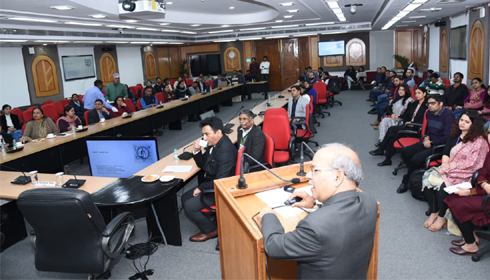
AI Transforming Healthcare Communication: Insights from AIIMS, Delhi
AI is increasingly transforming healthcare, from patient care to health communication. AIIMS, Delhi is leading the shift by investing over ₹300 crore in digital infrastructure to assist patients, clinicians, and researchers, according to Director Dr. M. Srinivas.
"By integrating AI, we can improve efficiency, reduce delays, and enable world-class research," said Dr. Srinivas at a recent AIIMS event. He emphasised the importance of AI in simplifying and sharing health information, empowering people, and boosting their involvement with healthcare institutions. These endeavours seek to improve health outcomes by increasing the accessibility and reliability of medical information.
The event gathered together healthcare executives, technologists, and politicians to debate AI's potential for closing major gaps in health communication. Dr. Kavita Narayan, Senior Technical Advisor, HRH for Health Systems, Ministry of Health and Family Welfare, was one of the presenters. She emphasised the need of developing robust systems that do not rely on individuals.
"AI can play a vital role in making healthcare more accurate, compassionate, and equitable," Dr. Narayan told reporters. She emphasised the importance of strategic technological integration and collaboration among politicians, technologists, and healthcare professionals in order to have a significant influence.
One of the event's notable innovations was Humeta, a custom-trained AI model unveiled by Mr Daleep Singh Manhas, Co-Founder and CEO of Healthpresso. Manhas emphasised Humeta's potential, saying, "Healthcare is a sensitive subject where trustworthiness is vital. Humeta is trained using over a million data points from reputable medical sources such as The Lancet and PubMed, guaranteeing that the information it outputs is both reliable and current."
Humeta addresses an important issue: the accessibility of medical content. "Sixty-three percent of people find it difficult to understand medical content," according to Manhas. He explained that Humeta breaks down difficult medical concepts into digestible formats such as text, graphics, and interactive tools, providing patients with dependable, user-friendly information.
As AI systems like Humeta evolve, they establish new standards for inclusivity and dependability in healthcare communication. By combining precision, real-time data retrieval, and conformance to global healthcare standards, such technologies promise to empower patients.
Despite AI's transformational potential, experts advise against over-reliance on technology. Dr. K.P. Kochhar, Head of the Physiology Department at AIIMS, emphasised the importance of balancing technology innovation and human sensitivity. "While AI can improve precision and efficiency, we must maintain the human touch in healthcare. "Compassion and technology must work together to create systems that prioritise patients' well-being," she stated.
The session closed with a collaborative call to action for the responsible and ethical integration of artificial intelligence into healthcare systems. Speakers asked governments, technologists, and healthcare professionals to work together to utilise AI for the greater good.
As AI advances, its intelligent application has the potential to shape a future in which healthcare communication is inclusive, dependable, and patient-centered. AI is transforming society by tackling long-standing issues of accessibility and trust.